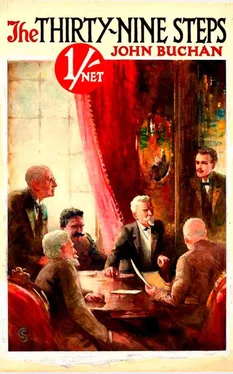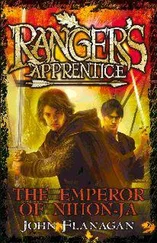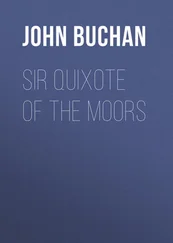John Buchan - The Thirty-Nine Steps
Здесь есть возможность читать онлайн «John Buchan - The Thirty-Nine Steps» — ознакомительный отрывок электронной книги совершенно бесплатно, а после прочтения отрывка купить полную версию. В некоторых случаях можно слушать аудио, скачать через торрент в формате fb2 и присутствует краткое содержание. Жанр: unrecognised, на английском языке. Описание произведения, (предисловие) а так же отзывы посетителей доступны на портале библиотеки ЛибКат.
- Название:The Thirty-Nine Steps
- Автор:
- Жанр:
- Год:неизвестен
- ISBN:нет данных
- Рейтинг книги:4 / 5. Голосов: 1
-
Избранное:Добавить в избранное
- Отзывы:
-
Ваша оценка:
- 80
- 1
- 2
- 3
- 4
- 5
The Thirty-Nine Steps: краткое содержание, описание и аннотация
Предлагаем к чтению аннотацию, описание, краткое содержание или предисловие (зависит от того, что написал сам автор книги «The Thirty-Nine Steps»). Если вы не нашли необходимую информацию о книге — напишите в комментариях, мы постараемся отыскать её.
The Thirty-Nine Steps — читать онлайн ознакомительный отрывок
Ниже представлен текст книги, разбитый по страницам. Система сохранения места последней прочитанной страницы, позволяет с удобством читать онлайн бесплатно книгу «The Thirty-Nine Steps», без необходимости каждый раз заново искать на чём Вы остановились. Поставьте закладку, и сможете в любой момент перейти на страницу, на которой закончили чтение.
Интервал:
Закладка:
TO
THOMAS ARTHUR NELSON
(LOTHIAN AND BORDER HORSE)
My Dear Tommy,
You and I have long cherished an affection for that elemental type of tale which Americans call the ‘dime novel’ and which we know as the ‘shocker’—the romance where the incidents defy the probabilities, and march just inside the borders of the possible. During an illness last winter I exhausted my store of those aids to cheerfulness, and was driven to write one for myself. This little volume is the result, and I should like to put your name on it in memory of our long friendship, in the days when the wildest fictions are so much less improbable than the facts.
J.B.
CHAPTER ONE – The Man Who Died
I returned from the City about three o’clock on that May afternoon pretty well disgusted with life. I had been three months in the Old Country, and was fed up with it. If anyone had told me a year ago that I would have been feeling like that I should have laughed at him; but there was the fact. The weather made me liverish, the talk of the ordinary Englishman made me sick. I couldn’t get enough exercise, and the amusements of London seemed as flat as soda-water that has been standing in the sun. ‘Richard Hannay,’ I kept telling myself, ‘you have got into the wrong ditch, my friend, and you had better climb out.’
It made me bite my lips to think of the plans I had been building up those last years in Bulawayo. I had got my pile—not one of the big ones, but good enough for me; and I had figured out all kinds of ways of enjoying myself. My father had brought me out from Scotland at the age of six, and I had never been home since; so England was a sort of Arabian Nights to me, and I counted on stopping there for the rest of my days.
But from the first I was disappointed with it. In about a week I was tired of seeing sights, and in less than a month I had had enough of restaurants and theatres and race-meetings. I had no real pal to go about with, which probably explains things. Plenty of people invited me to their houses, but they didn’t seem much interested in me. They would fling me a question or two about South Africa, and then get on their own affairs. A lot of Imperialist ladies asked me to tea to meet schoolmasters from New Zealand and editors from Vancouver, and that was the dismalest business of all. Here was I, thirty-seven years old, sound in wind and limb, with enough money to have a good time, yawning my head off all day. I had just about settled to clear out and get back to the veld, for I was the best bored man in the United Kingdom.
That afternoon I had been worrying my brokers about investments to give my mind something to work on, and on my way home I turned into my club—rather a pot-house, which took in Colonial members. I had a long drink, and read the evening papers. They were full of the row in the Near East, and there was an article about Karolides, the Greek Premier. I rather fancied the chap. From all accounts he seemed the one big man in the show; and he played a straight game too, which was more than could be said for most of them. I gathered that they hated him pretty blackly in Berlin and Vienna, but that we were going to stick by him, and one paper said that he was the only barrier between Europe and Armageddon. I remember wondering if I could get a job in those parts. It struck me that Albania was the sort of place that might keep a man from yawning.
About six o’clock I went home, dressed, dined at the Café Royal, and turned into a music-hall. It was a silly show, all capering women and monkey-faced men, and I did not stay long. The night was fine and clear as I walked back to the flat I had hired near Portland Place. The crowd surged past me on the pavements, busy and chattering, and I envied the people for having something to do. These shop-girls and clerks and dandies and policemen had some interest in life that kept them going. I gave half-a-crown to a beggar because I saw him yawn; he was a fellow-sufferer. At Oxford Circus I looked up into the spring sky and I made a vow. I would give the Old Country another day to fit me into something; if nothing happened, I would take the next boat for the Cape.
My flat was the first floor in a new block behind Langham Place. There was a common staircase, with a porter and a liftman at the entrance, but there was no restaurant or anything of that sort, and each flat was quite shut off from the others. I hate servants on the premises, so I had a fellow to look after me who came in by the day. He arrived before eight o’clock every morning and used to depart at seven, for I never dined at home.
I was just fitting my key into the door when I noticed a man at my elbow. I had not seen him approach, and the sudden appearance made me start. He was a slim man, with a short brown beard and small, gimlety blue eyes. I recognized him as the occupant of a flat on the top floor, with whom I had passed the time of day on the stairs.
‘Can I speak to you?’ he said. ‘May I come in for a minute?’ He was steadying his voice with an effort, and his hand was pawing my arm.
I got my door open and motioned him in. No sooner was he over the threshold than he made a dash for my back room, where I used to smoke and write my letters. Then he bolted back.
‘Is the door locked?’ he asked feverishly, and he fastened the chain with his own hand.
‘I’m very sorry,’ he said humbly. ‘It’s a mighty liberty, but you looked the kind of man who would understand. I’ve had you in my mind all this week when things got troublesome. Say, will you do me a good turn?’
‘I’ll listen to you,’ I said. ‘That’s all I’ll promise.’ I was getting worried by the antics of this nervous little chap.
There was a tray of drinks on a table beside him, from which he filled himself a stiff whisky-and-soda. He drank it off in three gulps, and cracked the glass as he set it down.
‘Pardon,’ he said, ‘I’m a bit rattled tonight. You see, I happen at this moment to be dead.’
I sat down in an armchair and lit my pipe.
‘What does it feel like?’ I asked. I was pretty certain that I had to deal with a madman.
A smile flickered over his drawn face. ‘I’m not mad—yet. Say, Sir, I’ve been watching you, and I reckon you’re a cool customer. I reckon, too, you’re an honest man, and not afraid of playing a bold hand. I’m going to confide in you. I need help worse than any man ever needed it, and I want to know if I can count you in.’
‘Get on with your yarn,’ I said, ‘and I’ll tell you.’
He seemed to brace himself for a great effort, and then started on the queerest rigmarole. I didn’t get hold of it at first, and I had to stop and ask him questions. But here is the gist of it:—
He was an American, from Kentucky, and after college, being pretty well off, he had started out to see the world. He wrote a bit, and acted as war correspondent for a Chicago paper, and spent a year or two in South-Eastern Europe. I gathered that he was a fine linguist, and had got to know pretty well the society in those parts. He spoke familiarly of many names that I remembered to have seen in the newspapers.
He had played about with politics, he told me, at first for the interest of them, and then because he couldn’t help himself. I read him as a sharp, restless fellow, who always wanted to get down to the roots of things. He got a little further down than he wanted.
I am giving you what he told me as well as I could make it out. Away behind all the Governments and the armies there was a big subterranean movement going on, engineered by very dangerous people. He had come on it by accident; it fascinated him; he went further, and then he got caught. I gathered that most of the people in it were the sort of educated anarchists that make revolutions, but that beside them there were financiers who were playing for money. A clever man can make big profits on a falling market, and it suited the book of both classes to set Europe by the ears.
Читать дальшеИнтервал:
Закладка:
Похожие книги на «The Thirty-Nine Steps»
Представляем Вашему вниманию похожие книги на «The Thirty-Nine Steps» списком для выбора. Мы отобрали схожую по названию и смыслу литературу в надежде предоставить читателям больше вариантов отыскать новые, интересные, ещё непрочитанные произведения.
Обсуждение, отзывы о книге «The Thirty-Nine Steps» и просто собственные мнения читателей. Оставьте ваши комментарии, напишите, что Вы думаете о произведении, его смысле или главных героях. Укажите что конкретно понравилось, а что нет, и почему Вы так считаете.












